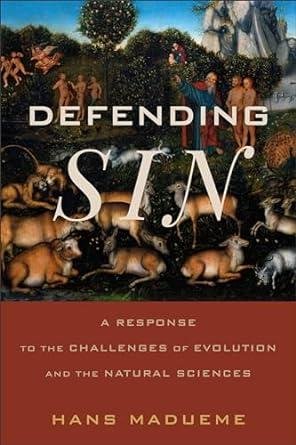Defending Sin: A Response to the Challenges of Evolution and the Natural Sciences by Hans Madueme
In recent years, the debate between science and religion has intensified, particularly regarding human origins and the concept of sin. Hans Madueme's book, "Defending Sin: A Response to the Challenges of Evolution and the Natural Sciences," offers a robust defense of traditional theological views against the backdrop of modern scientific theories. This article will delve into the key arguments presented by Madueme, the scientific challenges he addresses, and the broader implications for the relationship between faith and reason.
1. Introduction: The Intersection of Science and Theology
The rise of evolutionary biology and natural sciences has significantly impacted theological concepts, especially those related to human nature and morality. Evolutionary theory, which posits that humans evolved from common ancestors with other primates, challenges the traditional Christian doctrine of original sin. According to this doctrine, sin entered the world through the disobedience of Adam and Eve, resulting in a fallen human nature inherited by all their descendants.
Hans Madueme, an accomplished theologian, engages with these scientific claims and defends the biblical understanding of sin. His book is a thoughtful response to the perceived encroachment of science on theological territory, arguing that faith and science can coexist without compromising core Christian beliefs.
2. The Evolutionary Challenge to Original Sin
One of the primary challenges posed by evolutionary theory is its account of human origins, which seems to conflict with the biblical narrative of Adam and Eve. If humans evolved through a gradual process, it raises questions about the historical existence of a single pair of original humans and, consequently, the origin of sin.
Madueme acknowledges this challenge and critically examines the scientific evidence for evolution. He argues that while the scientific community widely accepts evolutionary theory, it is not without its limitations and controversies. Madueme suggests that the evidence for human evolution is not as definitive as often portrayed and that alternative interpretations consistent with a historical Adam and Eve are plausible.
3. Theological Responses to Evolution
Madueme's theological response to evolution is multifaceted. He begins by reaffirming the importance of the doctrine of original sin for Christian theology. Without this doctrine, the narrative of redemption through Jesus Christ loses its foundational basis. Therefore, any theological response must uphold the reality of original sin.
One approach Madueme explores is the idea of federal headship, where Adam serves as the representative head of humanity. This concept allows for the possibility that Adam and Eve were real historical figures, but their story might not be intended as a literal account of human origins. Instead, they symbolize the first humans' moral and spiritual state, whose actions had consequences for all their descendants.
Madueme also considers the possibility of a non-literal interpretation of the Genesis account, focusing on its theological rather than scientific message. He argues that the Genesis narrative conveys profound truths about human nature, sin, and the need for redemption, regardless of its compatibility with modern scientific accounts of human origins.
4. Sin and Morality in a Scientific World
Another significant aspect of Madueme's defense is his engagement with the scientific understanding of morality. Evolutionary biology often explains human moral behavior as a product of natural selection, suggesting that what we perceive as moral instincts evolved to enhance survival and reproductive success.
Madueme challenges this view by arguing that reducing morality to evolutionary processes undermines its objective and transcendent nature. If morality is merely a byproduct of evolution, it loses its binding authority and becomes subjective. Madueme asserts that a robust moral framework requires grounding in a transcendent source, which, for Christians, is God.
He also addresses the concept of sin from a scientific perspective, arguing that the recognition of moral failure and the need for redemption are universal human experiences that science alone cannot fully explain. While evolutionary psychology can describe certain aspects of human behavior, it falls short of addressing the deeper spiritual dimensions of sin and redemption.
5. Integrating Faith and Science
Madueme advocates for a constructive dialogue between faith and science, emphasizing that the two are not mutually exclusive. He encourages Christians to engage with scientific discoveries while maintaining their theological convictions. This integration requires a careful balance, recognizing the contributions of science to our understanding of the natural world without compromising core theological principles.
He also calls for humility from both scientists and theologians, acknowledging that each field has its own limits and areas of expertise. By fostering mutual respect and dialogue, Madueme believes that a more holistic understanding of human nature and morality can emerge, enriching both scientific and theological perspectives.
6. Conclusion: The Ongoing Debate
"Defending Sin: A Response to the Challenges of Evolution and the Natural Sciences" by Hans Madueme is a significant contribution to the ongoing debate between science and religion. Madueme's thoughtful engagement with evolutionary theory and his robust defense of the doctrine of original sin provide a compelling case for the coexistence of faith and reason.
His work underscores the importance of maintaining theological integrity while engaging with scientific advancements. By addressing the challenges posed by evolution and natural sciences, Madueme offers a pathway for Christians to uphold their faith in a scientifically informed world.
As the dialogue between science and theology continues, Madueme's book serves as a valuable resource for those seeking to navigate the complexities of this intersection. It challenges readers to consider the deeper questions of human nature, morality, and the need for redemption, reminding us that the quest for truth encompasses both the scientific and the spiritual realms.
